Though English is the primary language of Hawaii, the centuries-old Hawaiian language is still actively used. While you won’t need to learn to fluently speak Hawaiian for your vacation, I want to share some useful Hawaiian words and phrases to know for your trip.
Aloha means hello, goodbye and love. You will generally hear it used as a greeting.
Aloha Kakahiaka is the Hawaiian greeting to say good morning.
Mahalo means thank you. While you can always say thank you, it’s nicer if you say mahalo instead. It’s pronounced “mah hah lo.”
Ohana means family. You might hear of restaurant meals served ohana-style, which would mean family-style.
Keiki means child or children. You might see keiki menus or events and activities for keiki.
E komo mai means welcome.
Hale means house or home. (Haleakala means house of the sun.)
Wahine means lady, female. Restrooms may be labeled wahine instead of women.
Kane means man, male. Restrooms may be labeled kane instead of men.
Ono has two different meanings — it’s a fish and it also means delicious. You definitely want to find the ono food. Incidentally, the ono fish is a delicious fish.
Pau hana translates to end of the work day. Pau means end and hana means work. Keep your eyes open for pau hana restaurant and bar specials, which are known on the mainland as happy hour specials. You can get some great bargains on appetizers and drinks for pau hana.
Honu means Hawaiian green sea turtle. They are protected and you should not approach a honu in water or on a beach.
Kapu means forbidden and/or keep out. See our post about kapu.
Makai means towards the ocean or ocean side. You will see and hear directions using the word makai.
Mauka means towards the mountain. You may see and hear directions using the word mauka.
Pali means steep hill or cliff. You might hear that lava is flowing down the pali on Hawaii, the Big Island.
Aina means the land. Hawaiian culture has always had a focus on taking care of the land. You might also see the word kama’aina which means local, usually long-time Hawaii resident. Local residents with valid identification are eligible for kama’aina discounts.
A hui hou means until the next time we meet.
Hana hou means one more time, encore. You might hear locals shouting hana hou at the end of a concert if they want to hear the musicians play more songs.
Lanai means balcony, patio. Hawaii hotel rooms usually have lanais. See our post: What is a lanai? Note that Lana’i is an island near Maui.
Kokua means help, assistance. You might see a sign asking for your kokua in keeping the beaches clean.
Menehune are mythical and sometimes mischievous, small people who can build big structures almost magically overnight.
Wiki means fast. At Honolulu Airport, you will see the Wiki Wiki bus that quickishly transports you between the main and the inter-island terminals.
Pono means right or righteous. When you do something pono you’re doing the right thing morally. You might hear someone say the words malama pono to you as you are saying good bye. In that context, it means take care of yourself.
Mele Kalikimaka translate to Hawaii’s way of saying Merry Christmas. Learn more about the origin of Mele Kalikimaka and how to say it.
Hau’oli Makahiki Hou is Hawaii’s way of saying Happy New Year. Learn more about the origin of Hau’oli Makahiki Hou and how to say it.
Hau’oli La Hanau is Hawaii’s way of saying Happy Birthday.
As for how to pronounce these Hawaiian words and phrases, most consonants are pronounced excactly like we say on the US mainland. The only exception is that w is traditionally pronounced as a v-sound, though most Hawaii residents pronounce a w with the w-sound. Learning the Hawaiian vowel sounds can be a bit more tricky. Here’s our very basic guide to Hawaiian vowel pronunciation.
- a sounds like ah as in aloha
- e sounds like ay or eh as in say
- i sounds like ee as in bee
- o sounds like oh as in open
- u sounds like oo as in boo.
Hawaiian Pidgin is a variation of English words, but practically a language of its own. You might see or hear locals speaking Pidgin to you. Here are just a few examples of what you might hear:
Howzit is another way to say hello and/or how are you doing.
Dakine can take on many meanings from a whatchamacallit to the real deal. A man we met on Kauai was trying to explain to his wife what I do as a Hawaii travel blogger. Because the words Hawaii travel blogger had slipped his mind, he said, “She writes dakine.”
Grindz means food. You might see good food described as ono grindz.
Broke da mouth (also mouf or mout) means food that’s delicious.
Learning these words will definitely help make your Hawaii vacation easier to navigate. For you seasoned Hawaii travelers, are there any other words you would add to this list?
—
Need more advice for a trip to Hawaii? We cover the complete planning process — with everything from choosing an island to what to pack– in our First time to Hawaii visitors guide.


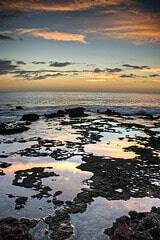
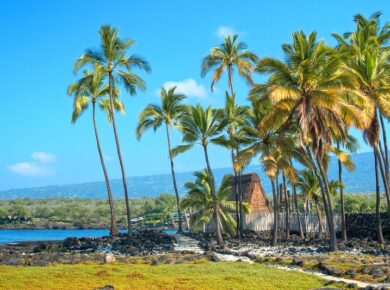
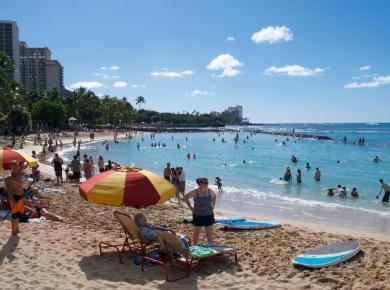
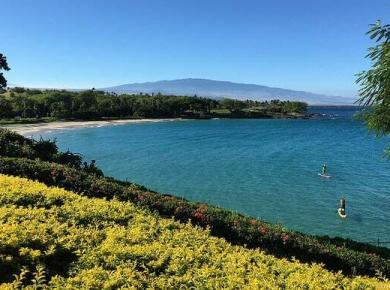
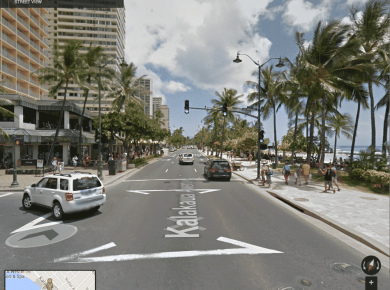
18 comments
I totally agree, that it is essential to know a new language when traveling. I think that knowing the Hawaiian language when going there is a sign of respect and shows that you must be somewhat native to the land. I have one question though with the rise of Americans traveling to Hawaii for vacation, Does the Hawaiian island speak more English than Hawaiian?
English is spoken far more than Hawaiian in Hawaii.
You will hear mahalo, aloha, keki and ohana often. Pretty much that’s all though. I lived there for many years.
Hi! I am going to be living in Hawaii for 3 years. Do you have any tips for a non local??
im actually in hawaii right now and they are speaking alot of english not much hawaiian
I’m late responding but for future visits—-If you are around tourist and downtown at the university or for a convention and or business; then basic common words. You will hear most “Aloha” a powerful greeting that means hello, goodbye, see ya later, and love (but that’s not the real meaning but how it’s used these days); “local,” short version means people with ancestral Hawaiian and or Hawaiian mixed Polynesian roots;
“Mahalo” means thank you; if around the community
….probably: “Ohana” means family;
Keiki means child or children; “E komo mai” means welcome; “pono” it means many things like good, and fair; “ono,” means delicious and “grind” means food and together on grind meaning delicious food; means “Howzit?;” means how are you or how are you doing (sometimes attached to braddah or sistah;) “da kine,” vague phrase (like watchmacallit, tingymagigit, n’what’not, you know what i’m saying, etc…) you can use when you don’t want to actually use words or for the words or something; and “Wahine & K?ne” meaning Women and Men — important for bathroom distinctions….simple
Pau,in pidgin means done or finished
Local Kona girl told me, pau means pau.
How about the tongue twisting Humuhumunukunuku apua’a ?
That’s the state fish
You mean the ones that…go swimmin’ by?
This sight is so fun. I went to high school and beauty school on Oahu.. Air Force Brat. Went on vacation last Dec and getting ready to go again. You pick up the slang after 6 years..the funniest thing to me..the gps people trying to pronounce the streets…???
I agree, the gps pronunciation is comical sometimes.
I went to school at moanalu high school in 1986-1987. It was relaxing and fun with cheap food to grind but expensive to live. I hear it’s different… After you break the ice locals were beautiful and loving… real ohana.
I lived in Hawaii my whole life and this is pretty accurate.
Does anyone know what this means in Hawaii, Noho Me Ka Hau-Oli
From a quick google search, it appears to mean “be happy”
I wish I could live there . That is my all time dream .